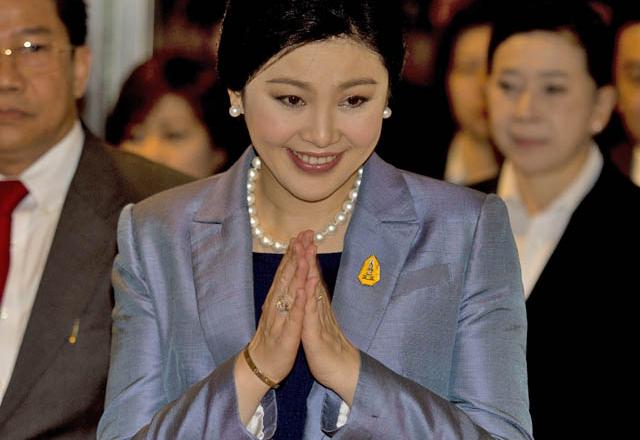BANGKOK — Thailand’s embattled premier will be charged with neglect of duty, anti-graft officials said Tuesday, as clashes between police and opposition protesters left four dead, and dozens wounded in central Bangkok.
The National Anti-Corruption Commission said that if found guilty of the accusations — which relate to a controversial rice subsidy scheme — Prime Minister Yingluck Shinawatra could be removed from office.
The announcement came hours after gunfire and explosions shook an area of the city’s historic district just a short walk away from major tourist attractions, as riot police moved to clear sites of protest rallies.
A policeman was shot dead and three civilians were killed, according to the Erawan emergency centre, while 64 others were injured. Police said 24 of its officers were among those hurt.
The protesters have staged more than three months of mass street rallies demanding Yingluck’s resignation, occupying major state buildings and preventing civil servants going to work.
Police launched another operation to reclaim besieged government buildings and clear rally sites in the capital Tuesday, tearing through razor wire and sandbag barricades.
They met fierce resistance from protesters and were eventually forced to retreat amid volleys of gunfire. It was unclear who was shooting.
“The government cannot work here anymore,” a spokesman for the protesters, Akanat Promphan, said from a rally site near Yingluck’s headquarters.
“The will of the people is still strong. The government is trapped. It has no way forward,” he added.
Bemused tourists caught up in the chaos were seen taking photos of the aftermath of the clashes near the backpacker haven of Khaosan Road.
“I heard there were political problems in Thailand but I came anyway,” said Jerome Dennehy, 45, from Ireland.
“It’s not good to see but this is one part of Bangkok, in a country of millions. It won’t stop my holiday.”
Around 150 opposition demonstrators were arrested at a different rally site at an energy ministry complex in the capital on charges of violating a state of emergency — the first mass detentions after the current protests began.
Years of rival protests
Thailand has been periodically rocked by mass demonstrations staged by rival protest groups since a controversial military coup in 2006 that ousted then-premier Thaksin Shinawatra — Yingluck’s brother.
Fifteen people have died and hundreds have been injured in political violence linked to the latest round of rallies.
Yingluck’s opponents say she is a puppet for her brother Thaksin, a billionaire tycoon-turned-politician who fled overseas in 2008 to avoid jail for a corruption conviction.
The protesters are demanding Yingluck hand power to a temporary, unelected government that would carry out reforms to tackle corruption and alleged misuse of public funds before new elections are held.
Pro-Thaksin parties have triumphed at the ballot box for more than a decade, helped by strong support in the northern half of the kingdom.
But many southerners and Bangkok residents accuse Thaksin and his sister of using taxpayers’ money to buy the support of rural voters through populist policies such as the rice farm subsidy scheme.
The National Anti-Corruption Commission said Yingluck had ignored warnings that the flagship rice policy was fostering corruption and causing financial losses. It summoned her to hear the charges on February 27.
Yingluck defended the scheme in a televised press conference Tuesday, accusing her opponents of causing the delays in payments to farmers.
“It’s a pity that Thai rice farmers’ dreams of a better life were destroyed by political games,” she said.
There was no immediate comment from Yingluck on the charges, but a spokesman for her Puea Thai Party questioned why the anti-graft panel was apparently giving priority to the rice scheme allegations over other corruption cases against the opposition Democrat Party.
“It is likely to be a process to overthrow Yingluck’s government,” said the spokesman, Pormpong Nopparit.
For more than a month demonstrators have blocked major intersections in a self-styled “shutdown” of Bangkok, although attendance has dropped sharply compared with December and January — when at the peak tens, or even hundreds, of thousands of people took to the streets.
Yingluck’s government held a general election on February 2 to try to ease tensions but the opposition boycotted the vote, saying it would not end the long-running political crisis.
The deployment of security forces has revived memories of a military crackdown on mass pro-Thaksin “Red Shirt” rallies in 2010 under the previous government that left dozens dead.













